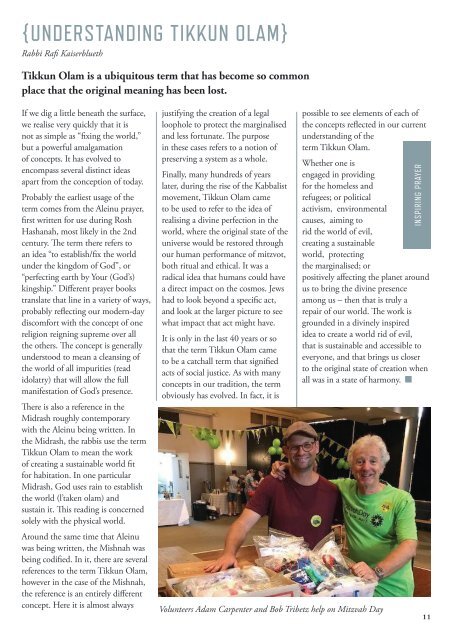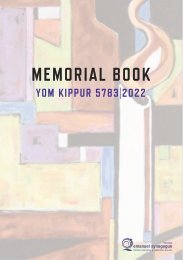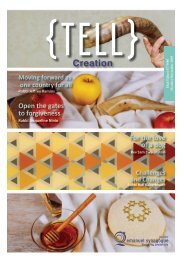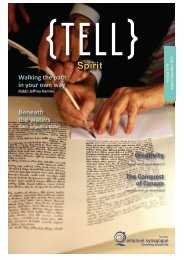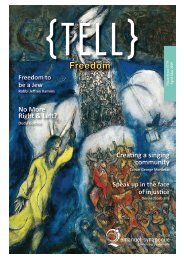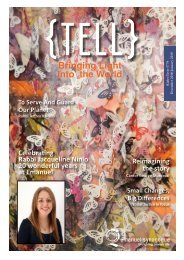Tell Magazine June 2018 5778
Emanuel Synagogue, Sydney - Tell Magazine June 2018 5778
Emanuel Synagogue, Sydney - Tell Magazine June 2018 5778
Create successful ePaper yourself
Turn your PDF publications into a flip-book with our unique Google optimized e-Paper software.
{UNDERSTANDING TIKKUN OLAM}<br />
Rabbi Rafi Kaiserblueth<br />
Tikkun Olam is a ubiquitous term that has become so common<br />
place that the original meaning has been lost.<br />
If we dig a little beneath the surface,<br />
we realise very quickly that it is<br />
not as simple as “fixing the world,”<br />
but a powerful amalgamation<br />
of concepts. It has evolved to<br />
encompass several distinct ideas<br />
apart from the conception of today.<br />
Probably the earliest usage of the<br />
term comes from the Aleinu prayer,<br />
first written for use during Rosh<br />
Hashanah, most likely in the 2nd<br />
century. The term there refers to<br />
an idea “to establish/fix the world<br />
under the kingdom of God”, or<br />
“perfecting earth by Your (God’s)<br />
kingship.” Different prayer books<br />
translate that line in a variety of ways,<br />
probably reflecting our modern-day<br />
discomfort with the concept of one<br />
religion reigning supreme over all<br />
the others. The concept is generally<br />
understood to mean a cleansing of<br />
the world of all impurities (read<br />
idolatry) that will allow the full<br />
manifestation of God’s presence.<br />
There is also a reference in the<br />
Midrash roughly contemporary<br />
with the Aleinu being written. In<br />
the Midrash, the rabbis use the term<br />
Tikkun Olam to mean the work<br />
of creating a sustainable world fit<br />
for habitation. In one particular<br />
Midrash, God uses rain to establish<br />
the world (l’taken olam) and<br />
sustain it. This reading is concerned<br />
solely with the physical world.<br />
Around the same time that Aleinu<br />
was being written, the Mishnah was<br />
being codified. In it, there are several<br />
references to the term Tikkun Olam,<br />
however in the case of the Mishnah,<br />
the reference is an entirely different<br />
concept. Here it is almost always<br />
justifying the creation of a legal<br />
loophole to protect the marginalised<br />
and less fortunate. The purpose<br />
in these cases refers to a notion of<br />
preserving a system as a whole.<br />
Finally, many hundreds of years<br />
later, during the rise of the Kabbalist<br />
movement, Tikkun Olam came<br />
to be used to refer to the idea of<br />
realising a divine perfection in the<br />
world, where the original state of the<br />
universe would be restored through<br />
our human performance of mitzvot,<br />
both ritual and ethical. It was a<br />
radical idea that humans could have<br />
a direct impact on the cosmos. Jews<br />
had to look beyond a specific act,<br />
and look at the larger picture to see<br />
what impact that act might have.<br />
It is only in the last 40 years or so<br />
that the term Tikkun Olam came<br />
to be a catchall term that signified<br />
acts of social justice. As with many<br />
concepts in our tradition, the term<br />
obviously has evolved. In fact, it is<br />
possible to see elements of each of<br />
the concepts reflected in our current<br />
understanding of the<br />
term Tikkun Olam.<br />
Whether one is<br />
engaged in providing<br />
for the homeless and<br />
refugees; or political<br />
activism, environmental<br />
causes, aiming to<br />
rid the world of evil,<br />
creating a sustainable<br />
world, protecting<br />
the marginalised; or<br />
positively affecting the planet around<br />
us to bring the divine presence<br />
among us – then that is truly a<br />
repair of our world. The work is<br />
grounded in a divinely inspired<br />
idea to create a world rid of evil,<br />
that is sustainable and accessible to<br />
everyone, and that brings us closer<br />
to the original state of creation when<br />
all was in a state of harmony.<br />
Volunteers Adam Carpenter and Bob Tribetz help on Mitzvah Day<br />
INSPIRING PRAYER<br />
11


